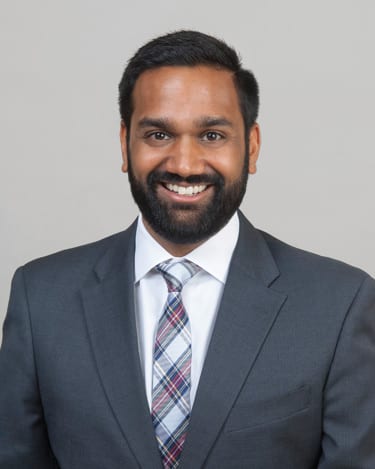
NEW FACULTY MEMBER TEJAS NARECHANIA ENCHANTED BY COLLEAGUES’ LEADERSHIP IN TECH LAW
One could forgive Tejas Narechania if he bragged a bit. Yet coupled with his impressive set of achievements in just five years since he graduated from law school—including a new tenure-track position at Berkeley Law—is a clear sense of humility.
“As a former UC Berkeley undergrad, I’m truly honored to be coming back as part of the law school faculty,” Narechania says. “The school is so well regarded, especially in my areas of research—law and technology, intellectual property, antitrust … I’m excited to learn from so many top scholars, some of whom essentially created their fields.”
Unanimously recommended by Berkeley Law’s faculty appointments committee, Narechania will arrive in July—after finishing a coveted clerkship on the U.S. Supreme Court, for Justice Stephen Breyer. “It’s been a humbling opportunity to interact so closely with Justice Breyer,” Narechania says.
“Walking into the Supreme Court every day, knowing that’s where I get to work … it’s a weighty responsibility and a genuine thrill.”
Narechania majored in electrical engineering and computer science at UC Berkeley, planning to “become a computer programmer for the rest of my life.” But a political science class that focused on legal and social issues related to technological change prompted him to major in that field, too— and to think more broadly about the intersections of law and technology.
That interest grew steadily during three years at Microsoft, where he helped develop marketing strategies for beta-version software and build training programs for high-value clients. Seeing the extent to which antitrust and other legal issues affected the company’s operations turned law-school curiosity into law-school applications.
Narechania earned his JD at Columbia, where he won numerous academic awards. After clerking for Chief Judge Diane Wood on the 7th U.S. Circuit Court of Appeals he was named special counsel to the Federal Communications Commission (FCC), where he helped develop net neutrality rules. In 2013, he returned to Columbia as a research fellow in law, science, and technology.
Narechania has already produced substantial published work that centers on innovation policy, tackling topics such as patent conflicts, judicial priorities, and government authority over broadband regulation. One of these papers was recently cited in the FCC’s proposed rulemaking on net neutrality, which he calls “exhilarating and gratifying.”
Narechania will teach a 1L property course and an IP-related seminar in 2016-17, and also teach Telecommunications Law and Policy in his second year. In addition, he’ll become a faculty co-director of the Berkeley Center for Law & Technology (BCLT). “Joining BCLT was a huge draw,” he says. “The center has been a longtime leader on tech-law issues and is well known for exceptional faculty, great resources, and a commitment to pursuing pioneering work. That’s one of many, many reasons why I’m so eager to get started.”
—Andrew Cohen
